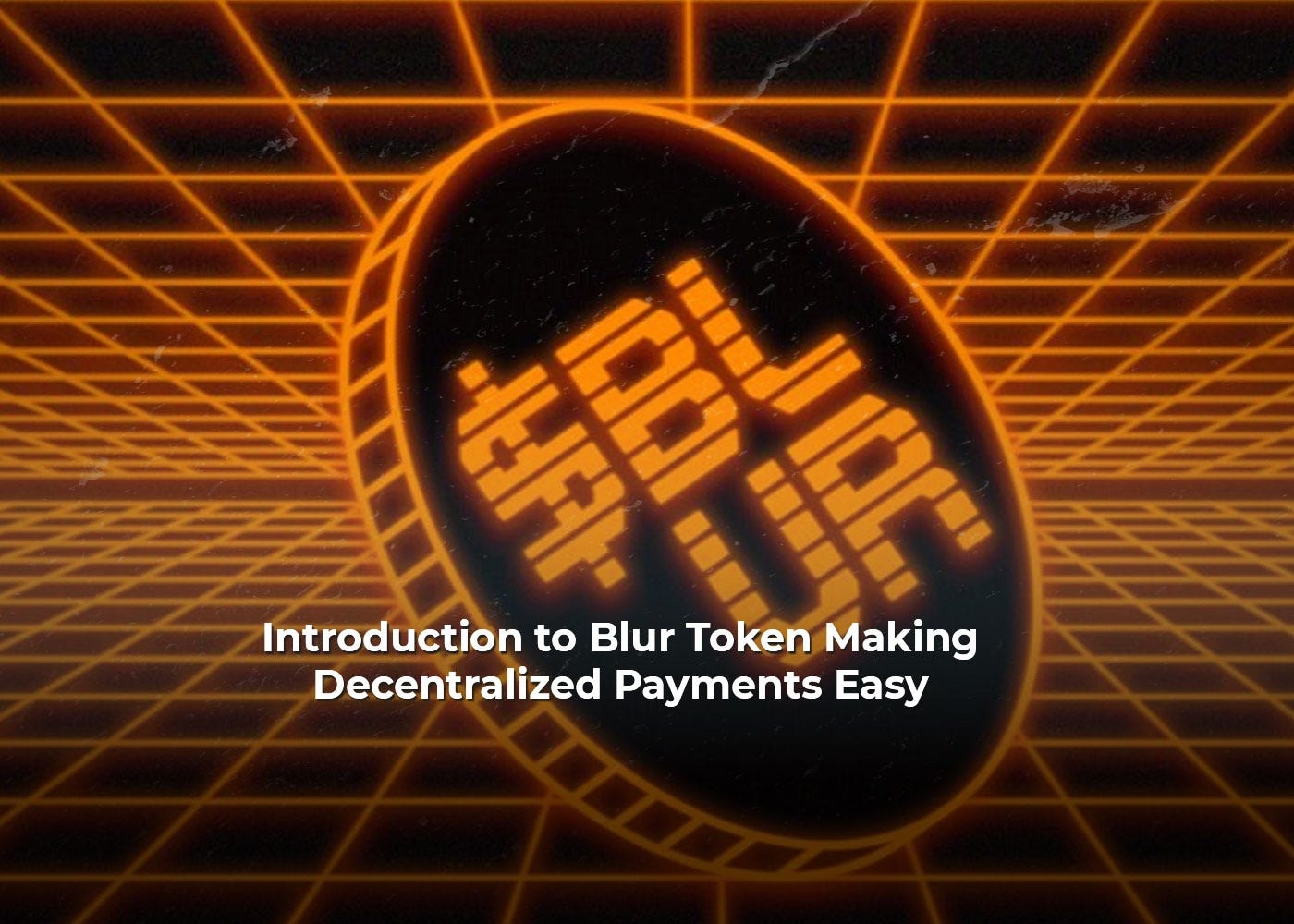Exploring the Importance of Blur Token Addresses in Privacy-Focused Cryptocurrencies
Blur: NFT | Blur: NFT login | Blur: NFT connect | WalletConnect | Traders | What Is Blur Crypto

Blur: NFT | Blur: NFT login | Blur: NFT connect | WalletConnect | Traders | What Is Blur Crypto
Privacy has become an increasingly important issue in the digital age, especially in the world of cryptocurrencies. As more and more transactions are conducted online, there is a growing concern about the security and privacy of personal information. To address this concern, privacy cryptocurrencies have emerged, offering a way to protect the identity and transactions of users. One of the key features of these cryptocurrencies is the use of blur token addresses.
Blur token addresses are a unique feature that allows users to obfuscate their transaction history and protect their privacy. These addresses are generated for each transaction, making it difficult for anyone to trace the origin or destination of the funds. Unlike traditional cryptocurrencies, where transactions are public and visible to everyone on the blockchain, privacy cryptocurrencies utilize blur token addresses to add an extra layer of privacy and security.
By using blur token addresses, privacy cryptocurrencies ensure that the sender, receiver, and the amount of the transaction remain anonymous. This is achieved by mixing up the token addresses and creating a complex network of transactions that are nearly impossible to track. Even the most sophisticated analysis techniques would struggle to unravel the true identities and activities of users. As a result, privacy cryptocurrencies offer a level of anonymity and security that is unparalleled in the digital world.
Furthermore, blur token addresses not only protect the privacy of individuals but also foster a sense of trust and confidence in the cryptocurrency ecosystem. Users can transact without the fear of their personal information being exposed or exploited. This privacy-centric approach has gained traction among individuals and businesses who value their privacy and seek to safeguard their financial transactions from prying eyes.
The Significance of Blur Token Addresses
Blur token addresses play a crucial role in privacy cryptocurrencies. These addresses ensure the anonymity and privacy of transactions within the Blur.io network.
When transacting with Blur tokens, users are assigned blur token addresses that do not reveal their real-world identities. This pseudonymity is achieved through the use of cryptographic techniques that obfuscate the link between the token address and the user.
This privacy feature offers several advantages:
1. Enhanced Privacy: Blur token addresses prevent onlookers from tracing transactions back to the individuals involved. This protects users from potential surveillance and ensures that their financial activities remain confidential.
2. Protection against Identity Theft: With blur token addresses, users can transact without their personal information being exposed. This reduces the risk of identity theft and minimizes the potential for fraudulent activities.
3. Security of Funds: By using blur token addresses, users can ensure the security of their funds. The anonymity provided by these addresses makes it difficult for attackers to target specific individuals or wallets, as they cannot easily link the addresses to real-world identities.
To take full advantage of blur token addresses, users can explore the features and benefits of Blur.io, a privacy-focused NFT marketplace. With Blur.io, users can securely transact using blur tokens while enjoying the benefits of anonymity and privacy. Conexión a Blur.io: Explorar las características y ventajas de Blur.io.
Exploring Privacy Cryptocurrencies
Privacy cryptocurrencies have gained significant attention in recent years due to the increasing demand for privacy and security in financial transactions. These cryptocurrencies offer a number of features and technologies that allow users to protect their identities and transaction details from prying eyes. This article explores the significance of blur token addresses in privacy cryptocurrencies and how they contribute to maintaining privacy and anonymity in the digital world.
What are Privacy Cryptocurrencies?
Privacy cryptocurrencies, also known as anonymous cryptocurrencies, are digital currencies that focus on preserving the privacy and anonymity of users. These cryptocurrencies utilize various technologies and protocols, such as ring signatures, zk-SNARKs, and bulletproofs, to ensure that transaction details are obfuscated and identities are protected.
The Role of Blur Token Addresses
One of the key features in privacy cryptocurrencies is the use of blur token addresses. These addresses are randomly generated and serve as a shield for the actual wallet addresses of the users. By using blur token addresses, it becomes extremely difficult for anyone to trace transactions back to their original sender or receiver.
When a user initiates a transaction in a privacy cryptocurrency, the funds are sent from the user's actual wallet address to a temporary blur token address. This blur token address is created solely for that transaction and is not linked to the user's identity or actual wallet address. Once the transaction is complete, the funds are then transferred from the blur token address to the receiver's actual wallet address.
This process of using blur token addresses provides an additional layer of privacy and anonymity to the users. It ensures that transaction details cannot be easily tied back to a specific user or their actual wallet address. This makes it extremely challenging for anyone, including governments or authorities, to track and monitor financial activities on the blockchain.
Advantages of Blur Token Addresses

The use of blur token addresses in privacy cryptocurrencies offers several advantages. Firstly, it enhances the privacy and anonymity of users, allowing them to conduct transactions without fearing surveillance or identification. This is especially important in maintaining financial freedom and protecting sensitive information.
Secondly, blur token addresses make it difficult for blockchain analysis companies to track and analyze transaction patterns. This makes it harder for third parties to create profiles or determine spending habits based on transaction data. This ensures a higher level of privacy for users.
Lastly, blur token addresses also contribute to the fungibility of privacy cryptocurrencies. Fungibility is the property of a currency that makes individual units interchangeable. With blur token addresses, every token becomes indistinguishable from another, ensuring that they are equally valued and accepted within the network.
Monero
Ring Signatures, Stealth Addresses
Zcash
zk-SNARKs
Dash
PrivateSend (CoinJoin)
In conclusion, privacy cryptocurrencies have revolutionized the way financial transactions are conducted by prioritizing privacy and anonymity. The use of blur token addresses plays a crucial role in ensuring that transaction details and user identities remain concealed. This technology offers numerous benefits, including enhanced privacy, resistance to blockchain analysis, and increased fungibility. As the demand for privacy and security grows, privacy cryptocurrencies are likely to become even more prevalent in the digital world.
The Importance of Privacy in Cryptocurrency
Privacy is a crucial aspect of any cryptocurrency, and its significance cannot be underestimated. In an era where digital transactions are becoming increasingly common, it is essential to ensure that one's financial information remains secure and confidential.
Privacy cryptocurrencies, such as BLUR.IO, are designed to provide users with a high level of anonymity and protect their transactional data from prying eyes. The use of blur token addresses is a key aspect of this privacy-focused approach.
Blur token addresses play a vital role in maintaining privacy by obscuring the connection between the sender and receiver of a transaction. By masking the actual addresses involved, it becomes extremely difficult for anyone to trace and identify the parties involved in a transaction.
This level of privacy has numerous advantages. Firstly, it ensures that sensitive financial information is not vulnerable to hacking or theft. Cybercriminals cannot exploit the transactional data to target individuals or gain unauthorized access to their funds.
Moreover, privacy coins like BLUR.IO also protect individuals from unwanted surveillance by governments, corporations, or any other third parties. They provide a means for individuals to exercise their right to financial privacy and prevent unwarranted intrusion into their personal lives.
By utilizing privacy coins and blur token addresses, individuals can take control of their financial information and engage in transactions securely and anonymously. For those concerned about their financial privacy, BLUR.IO provides a reliable and efficient solution.
To learn more about how to log in to your BLUR.IO account, please visit BLUR.IO アカウントへのログイン方法. Protect your financial privacy and embrace the advantages of privacy-focused cryptocurrencies like BLUR.IO.
Understanding the Concept of Blur Token Addresses
The concept of blur token addresses is key to understanding the privacy features offered by some cryptocurrencies. Blur token addresses are designed to obfuscate transaction details, ensuring the privacy and anonymity of users.
What are Blur Token Addresses?
Blur token addresses are cryptographic representations of the actual addresses used in a cryptocurrency transaction. Instead of broadcasting the real addresses involved, privacy cryptocurrencies use blur token addresses to mask the sender and receiver information.
These blur token addresses are created using advanced cryptographic techniques like zero-knowledge proofs or ring signatures. These techniques ensure that the transaction details are encrypted and can only be decrypted by the intended recipient.
How Do Blur Token Addresses Work?
When a user initiates a transaction in a privacy cryptocurrency, the sender’s address is converted into a blur token address. This address, along with the transaction details, is then sent to the network.
This process is repeated for the recipient's address, converting it into a blur token address as well. The network, through its privacy protocols, ensures that the transaction details are recorded without revealing the actual addresses involved.
Once the transaction is confirmed, the recipient can decode the blur token address to obtain the actual address and access the funds. This ensures that only the recipient is able to associate the blur token address with a real-world address.
The Privacy Benefits of Blur Token Addresses
Blur token addresses offer several privacy benefits. By obfuscating the sender and recipient addresses, it becomes much more difficult to link transactions or trace the flow of funds.
Enhanced Anonymity: Blur token addresses help protect the identity of the individuals involved in a transaction, making it difficult to tie them to specific addresses or activities.
Improved Fungibility: Privacy cryptocurrencies that utilize blur token addresses enhance fungibility by ensuring all tokens have the same value, regardless of their transaction history.
Reduced Surveillance: By using blur token addresses, privacy cryptocurrencies limit the ability of external entities, such as governments or corporations, to monitor or track transactions.
In conclusion, blur token addresses play a crucial role in privacy cryptocurrencies by safeguarding the privacy and anonymity of users. With their ability to obfuscate transaction details, these addresses provide enhanced privacy benefits that are necessary in an increasingly digital and interconnected world.
Anonymity and Security Provided by Blur Token Addresses
The use of blur token addresses in privacy cryptocurrencies offers a high level of anonymity and security to users. These addresses are specifically designed to hide the identity and transaction history of individuals, making it difficult for anyone to trace their activity on the blockchain.
Blur token addresses work by obfuscating the sender and receiver information in a transaction. Instead of using traditional addresses that can be easily linked to individuals, blur token addresses generate random and temporary addresses for each transaction.
This means that even if someone were to obtain one of these blur token addresses, they would not be able to associate it with a specific user or transaction. Without this link, it becomes nearly impossible to track and monitor an individual's financial activity.
In addition to anonymity, blur token addresses also provide enhanced security. By using these addresses, users can protect themselves from potential hacks or privacy breaches. Since the addresses are random and temporary, they are much more difficult for hackers to exploit compared to traditional addresses.
Furthermore, blur token addresses often employ additional security measures such as encryption and multi-signature authentication. These measures provide an extra layer of protection against unauthorized access to funds and transactions.
Overall, the use of blur token addresses in privacy cryptocurrencies significantly enhances the anonymity and security of users. By obscuring transaction details and employing additional security measures, these addresses ensure that individuals can engage in financial transactions with confidence and peace of mind.
Increased Adoption of Privacy Cryptocurrencies

The adoption of privacy cryptocurrencies has been steadily increasing as individuals and businesses become more concerned about their online privacy and security. Privacy cryptocurrencies offer enhanced privacy features that allow users to conduct transactions without revealing their personal identities or transaction details.
One of the main reasons for the increased adoption of privacy cryptocurrencies is the growing awareness of the importance of data privacy. With the rise of social media platforms and online services that collect and monetize user data, individuals are becoming more conscious about protecting their personal information.
Privacy cryptocurrencies, such as Monero (XMR) and Zcash (ZEC), utilize techniques like ring signatures, stealth addresses, and zero-knowledge proofs to ensure the privacy and anonymity of their users. These features make it difficult to trace transactions and link them back to specific individuals or addresses.
Benefits of Privacy Cryptocurrencies

There are several key benefits that contribute to the increased adoption of privacy cryptocurrencies:
1. Enhanced Privacy
Privacy cryptocurrencies offer a higher level of privacy compared to traditional cryptocurrencies like Bitcoin. By obfuscating transaction details and user identities, privacy cryptocurrencies protect individuals from potential financial surveillance and identity theft.
2. Protection Against Transaction Analysis
Privacy cryptocurrencies make it difficult for malicious actors to analyze transaction patterns and trace funds. This protects users from being targeted based on their transaction history.
3. Trustless Transactions

Privacy cryptocurrencies enable trustless transactions, meaning that users can transact with each other without the need for intermediaries or third-party involvement. This reduces the risk of censorship, fraud, and centralization.
4. Financial Freedom

Privacy cryptocurrencies empower individuals to have full control over their finances. With privacy features, users can securely store and transfer their wealth without the fear of being monitored or controlled by centralized authorities.
Privacy cryptocurrencies are gaining traction not only among individuals but also in the business world. Businesses are starting to accept privacy cryptocurrencies as a form of payment, recognizing the value of protecting customer financial information. Additionally, privacy-conscious individuals are using privacy cryptocurrencies as a means of charitable giving, as it allows them to contribute without revealing their wealth or personal identity.
In conclusion, the increased adoption of privacy cryptocurrencies can be attributed to the growing demand for enhanced privacy and security. Privacy cryptocurrencies provide individuals and businesses with the means to protect their financial information and conduct transactions without compromising their privacy. As the awareness of online privacy grows, we can expect the adoption of privacy cryptocurrencies to continue to rise.
Protecting Personal Information with Blur Token Addresses

In the world of privacy cryptocurrencies, the use of blur token addresses has gained significant attention due to its ability to protect personal information. A blur token address is a unique identifier that is generated for each transaction, making it difficult to trace back to the original owner.
One of the main advantages of blur token addresses is the anonymity they provide. By using a blur token address, individuals can protect their personal information and maintain their privacy when conducting transactions. This is particularly important in an era where data breaches and identity theft are on the rise.
Blur token addresses are designed to be pseudonymous, meaning that they do not reveal the true identity of the owner. Instead, they provide a layer of protection by creating a temporary address that cannot be easily linked back to the individual. This makes it difficult for third parties to track, monitor, or exploit personal information.
Another benefit of blur token addresses is their convenience. Unlike traditional financial systems that require individuals to share sensitive personal information, blur token addresses allow for secure transactions without the need for divulging personal details. This not only reduces the risk of identity theft but also streamlines the transaction process.
However, it is important to note that while blur token addresses provide a higher level of privacy and security, they are not completely foolproof. In some cases, determined individuals or organizations may still be able to trace transactions back to their original source.
Conclusion
Overall, blur token addresses play a crucial role in protecting personal information in privacy cryptocurrencies. They provide a layer of anonymity, making it challenging for third parties to track individuals and exploit their data. While not perfect, blur token addresses offer a significant improvement in privacy and security compared to traditional financial systems.
If you are interested in learning more about blur token addresses and how to protect your personal information, you can visit CÓMO INICIAR SESIÓN EN BLUR.IO for more information.
Privacy-Enhancing Features of Blur Token Addresses

Privacy cryptocurrencies, such as Blur, incorporate various features that enhance user anonymity and protect sensitive financial information. One of the key components of these privacy-enhancing cryptocurrencies is the use of blur token addresses. Blur token addresses are a type of cryptographic address that help in obfuscating the transaction details, ensuring that the sender's and receiver's identities remain confidential.
One of the primary benefits of blur token addresses is that they break the direct link between the sender and the receiver, making it difficult for anyone to trace the transactions and identify the individuals involved. This is achieved by employing advanced cryptographic techniques, such as ring signatures and stealth addresses.
Ring signatures allow for the creation of a group of possible signers, making it impossible to determine which individual actually sent the transaction. By mixing the sender's true signature with signatures of unrelated individuals in the ring, blur token addresses ensure plausible deniability and protect the anonymity of the sender.
Stealth addresses further enhance privacy by generating unique, one-time addresses for every transaction. When a payment is made to a blur token address, it is virtually impossible to link the transaction to a specific user or their wallet. The funds are securely received, while preserving privacy.
Additionally, blur token addresses also provide optional features like address expiration or time-based delays, adding an extra layer of privacy. These features allow users to set a time after which the blur token address is no longer valid, preventing unauthorized access to their transaction history.
Another notable advantage of blur token addresses is their compatibility with existing blockchain networks. Privacy cryptocurrencies implement blur token addresses as a modification to the existing address format, ensuring interoperability and easy adoption.
Anonymity through ring signatures
Unique, one-time addresses with stealth addresses
Optional features like address expiration and time-based delays
Compatibility with existing blockchain networks
In conclusion, the privacy-enhancing features of blur token addresses play a crucial role in safeguarding the confidentiality of transactions in privacy cryptocurrencies. By employing advanced cryptographic techniques and additional privacy options, blur token addresses ensure that user identities remain protected, promoting the adoption and use of privacy-focused cryptocurrencies like Blur.
Preventing Transaction Tracing with Blur Token Addresses

In privacy cryptocurrencies, the use of blur token addresses plays a crucial role in ensuring transaction privacy and preventing transaction tracing. Unlike traditional cryptocurrencies like Bitcoin, where transaction details are publicly visible on the blockchain, privacy cryptocurrencies utilize blur token addresses to obscure the true identities and amounts involved in a transaction.
The concept of blur token addresses revolves around the idea of obfuscation. By generating multiple intermediate addresses for each transaction, privacy cryptocurrencies make it significantly harder for external observers to trace the flow of funds and link transactions to specific individuals or entities.
How Blur Token Addresses Work
When a user initiates a transaction in a privacy cryptocurrency, the sender's actual address is concealed by generating a new intermediate address. This intermediate address acts as a temporary holding location for the funds. Once the transaction is complete, the funds are transferred to another intermediate address before reaching the final recipient.
These intermediate addresses serve as a smokescreen, making it virtually impossible for someone to link the transaction back to the sender or receiver. By inserting several intermediaries in the process, privacy cryptocurrencies achieve a high level of fungibility and transactional privacy.
Benefits of Blur Token Addresses
Blur token addresses provide several key benefits in the realm of privacy cryptocurrencies:
Enhanced Privacy: Blur token addresses ensure that the identities of the sender and receiver, as well as the amounts being transacted, remain hidden from external observers. This helps safeguard sensitive financial information and protects user privacy.
Transaction Unlinkability: By utilizing multiple intermediate addresses, privacy cryptocurrencies break the link between transactions, making it challenging to trace the flow of funds. This prevents the creation of transaction histories and ensures transactional unlinkability.
Improved Fungibility: With blur token addresses, all tokens within a privacy cryptocurrency network become indistinguishable from one another. This enhances fungibility, as every token is considered equal in value and can be used interchangeably without fear of being tainted by previous transactions.
In conclusion, blur token addresses play a vital role in ensuring the privacy and anonymity of transactions within privacy cryptocurrencies. By obscuring the true identities and amounts involved in a transaction, these addresses prevent transaction tracing and preserve the fungibility of privacy cryptocurrencies.
The Role of Blur Token Addresses in Decentralization
Blur token addresses play a crucial role in ensuring the decentralization of privacy cryptocurrencies. Privacy is one of the core principles of cryptocurrencies, and it is achieved through the use of decentralized technologies like blockchain. However, without the use of blur token addresses, the privacy and decentralization of cryptocurrencies could be compromised.
A blur token address is a unique identifier that is associated with a specific transaction or user in a privacy cryptocurrency network. Unlike traditional cryptocurrencies, where transactions are recorded on a public ledger and can be traced back to the sender and receiver, privacy cryptocurrencies utilize blur token addresses that mask the details of the transaction. This ensures that the transaction remains private and untraceable.
The Importance of Privacy in Decentralization
Decentralization is a key principle of cryptocurrencies as it removes the need for intermediaries, such as banks, and enables peer-to-peer transactions. However, privacy is equally important in creating a truly decentralized system. Without privacy, transactions can be easily monitored and traced, which goes against the principles of decentralization and leads to the loss of financial freedom and anonymity.
Blur token addresses provide privacy by ensuring that individual transactions cannot be linked to specific users. This helps in maintaining the decentralization of the cryptocurrency network by preserving the anonymity of its users. By obscuring transaction details, privacy cryptocurrencies empower individuals to transact freely without the fear of being monitored or censored.
The Trust Factor
The use of blur token addresses also helps in building trust within the privacy cryptocurrency ecosystem. With the growing concerns around surveillance and data breaches, individuals are becoming more cautious about their online activities. By integrating privacy-focused features like blur token addresses, privacy cryptocurrencies demonstrate a commitment to safeguarding user privacy, which in turn enhances trust among its users.
In a decentralized system, trust is crucial for the network to operate efficiently. By offering privacy through blur token addresses, privacy cryptocurrencies create a trustless environment where users can confidently transact without relying on third parties.
In conclusion, blur token addresses play a vital role in ensuring the decentralization of privacy cryptocurrencies. They enable private and untraceable transactions, which are essential for maintaining financial freedom, anonymity, and trust in decentralized networks. As privacy becomes an increasingly important concern, the use of blur token addresses will continue to be a crucial component in the development of privacy-focused cryptocurrencies.
Privacy Versus Transparency in Cryptocurrency
Privacy and transparency are two essential aspects that often compete with each other in the world of cryptocurrency. While privacy-focused cryptocurrencies aim to ensure the anonymity of transactions, transparent cryptocurrencies prioritize visibility and accountability. The balance between privacy and transparency is a crucial discussion in the cryptocurrency community.
The Importance of Privacy in Cryptocurrency
Privacy-focused cryptocurrencies, such as Monero and Zcash, address the need for confidentiality in financial transactions. These cryptocurrencies use various technologies, including secure cryptographic algorithms, to obfuscate transaction details and hide user identities. By offering a high level of privacy, these cryptocurrencies aim to protect users from surveillance, identity theft, and other malicious activities.
Privacy is particularly important in the context of financial transactions as it prevents the tracing of funds and ensures the confidentiality of personal information. It allows individuals to retain control over their financial data and activities, preventing unwanted scrutiny from governments, corporations, and criminals.
The Role of Transparency in Cryptocurrency
Transparent cryptocurrencies, such as Bitcoin and Ethereum, prioritize visibility and accountability. Transactions on these networks are publicly recorded on a blockchain, allowing anyone to view them. The transparent nature of these cryptocurrencies fosters trust and enables users to verify the authenticity and integrity of transactions.
Transparency also plays a vital role in preventing fraudulent activities and money laundering. By providing a clear audit trail, transparent cryptocurrencies make it easier to track and identify suspicious transactions. This transparency encourages compliance with regulatory requirements and contributes to the legitimacy of the cryptocurrency ecosystem.
The Challenge of Balancing Privacy and Transparency

Striking the right balance between privacy and transparency is a challenge in the cryptocurrency space. While privacy-focused cryptocurrencies may provide strong anonymity, they can also attract illicit activities due to the difficulty in tracking transactions. On the other hand, transparent cryptocurrencies may compromise privacy by exposing sensitive financial information.
Regulatory bodies and governments often struggle to define the appropriate level of privacy and transparency in cryptocurrencies. Stricter regulations may limit privacy to combat money laundering and illegal activities, while looser regulations may prioritize privacy but raise concerns about the misuse of anonymous transactions.
As the cryptocurrency industry evolves, finding a balance between privacy and transparency is crucial. Innovative solutions, such as privacy-enhancing technologies and improved regulatory frameworks, may help address this challenge and enable cryptocurrencies to achieve both privacy and transparency.
Challenges and Limitations of Blur Token Addresses
While blur token addresses have proven to be a valuable tool in enhancing privacy for cryptocurrencies, there are certain challenges and limitations associated with their implementation.
Lack of User-Friendliness:
One of the major challenges is the complexity and lack of user-friendliness in generating and managing blur token addresses. The cryptographic techniques that enable blur tokens to obscure transaction details require technical expertise, making it difficult for the average user to adopt and implement them.
Interaction with Existing Infrastructure:
Another limitation is the interaction of blur token addresses with existing infrastructure. As privacy cryptocurrencies integrate blur token technology, they need to ensure compatibility with existing wallets, exchanges, and merchant systems. This can be challenging, especially if user adoption is limited.
Blockchain Scalability:
The implementation of blur token addresses can also pose scalability challenges for the blockchain. The cryptographic computations required for generating blur tokens can be computationally intensive, potentially slowing down the network and increasing transaction times. This can be a significant limitation in achieving widespread adoption of privacy cryptocurrencies.
Regulatory Considerations:
Privacy-focused cryptocurrencies often face regulatory scrutiny due to concerns about money laundering and illicit activities. Blur token addresses, by design, obscure transaction details, which can create challenges in complying with anti-money laundering (AML) and Know Your Customer (KYC) regulations. Striking a balance between privacy and regulatory compliance remains a significant challenge for the implementation of blur token addresses.
Increased Vulnerability to Attacks:
While blur token addresses enhance privacy, they can also introduce increased vulnerability to attacks. The cryptographic techniques used in blur token technology may have vulnerabilities that could be exploited by sophisticated attackers. It is crucial to continuously assess and address such vulnerabilities to ensure the security and integrity of privacy cryptocurrencies.
In conclusion, blur token addresses offer significant privacy benefits for cryptocurrencies, but they also present challenges and limitations that need to be addressed for widespread adoption. Overcoming these challenges will require collaboration among developers, regulators, and users to create a robust and user-friendly privacy framework.
Regulatory Perspectives on Privacy Cryptocurrencies
Privacy cryptocurrencies have become a topic of interest in the financial and regulatory sectors. While these digital currencies offer enhanced privacy and security features, they have also raised concerns from regulatory bodies and law enforcement agencies. In this section, we will explore the regulatory perspectives on privacy cryptocurrencies.
1. AML and KYC Compliance
One of the primary concerns for regulators is the potential misuse of privacy cryptocurrencies for money laundering and other illicit activities. Privacy coins, which offer a higher level of anonymity, can make it difficult for authorities to trace transactions and identify the individuals involved. As a result, regulators often require cryptocurrency exchanges and service providers to implement stricter Anti-Money Laundering (AML) and Know Your Customer (KYC) procedures when dealing with privacy cryptocurrencies.
2. Financial Crime Investigations
Privacy cryptocurrencies have been associated with high-profile cases involving financial crimes such as tax evasion and illicit fund transfers. The heightened anonymity provided by these coins can make it challenging for authorities to gather the necessary evidence and track down the offenders. As a result, regulators may push for enhanced monitoring and investigative tools to combat financial crimes associated with privacy cryptocurrencies.
Despite these concerns, some privacy cryptocurrencies are working towards striking a balance between privacy and regulatory compliance. For example, certain projects incorporate optional transparency features that allow users to prove the legitimacy of their transactions when required by law enforcement or regulatory bodies. This approach aims to address the concerns raised by regulators while preserving the privacy features that make these currencies attractive to users.
Overall, the regulatory perspectives on privacy cryptocurrencies are complex and evolving. While there are legitimate concerns regarding their potential misuse, finding a balance between privacy and compliance is crucial to ensure the benefits of these cryptocurrencies can be enjoyed while effectively managing the associated risks.
Integrating Blur Token Addresses into Existing Platforms
Privacy cryptocurrencies, like Blur, offer innovative solutions to address the growing concerns regarding the privacy of transactions. One of the key features of privacy-focused cryptocurrencies is the use of blur token addresses.
Integrating blur token addresses into existing platforms can bring numerous benefits to both users and businesses. By adopting this technology, platforms can enhance the privacy and security of transactions, providing users with a greater level of anonymity.
Enhanced Privacy
By integrating blur token addresses, existing platforms can offer users a more secure and private way to transact. Blur token addresses function as a shield, preventing the linkage of transaction history to real-world identities. This enhanced privacy feature can be crucial for individuals who prioritize confidentiality and security in their transactions.
Integrating blur token addresses also provides a layer of protection against potential hacking or data breaches. As the blur token addresses are randomized and unlinkable to specific users, the risk of personal information being exposed or stolen is significantly reduced.
Increased Adoption
The integration of blur token addresses into existing platforms can also drive the adoption of privacy cryptocurrencies. By offering a seamless and user-friendly experience, platforms can attract users who are seeking more secure and private transaction options.
Furthermore, by integrating blur token addresses, platforms can tap into the growing demand for privacy-focused solutions. With increasing concerns about data privacy and surveillance, individuals and businesses are becoming more conscious about protecting their financial transactions.
In conclusion, integrating blur token addresses into existing platforms can provide enhanced privacy and security to users, protecting them from potential privacy breaches and attracting a wider audience interested in privacy-focused solutions. As the demand for privacy cryptocurrencies continues to grow, integrating this technology can help platforms stay ahead of the market and cater to the evolving needs of their users.
Future Potential of Privacy Cryptocurrencies
The future of privacy cryptocurrencies is incredibly promising, with several key factors pointing towards their continued growth and adoption in the years to come.
Rising Concerns Over Privacy
In the digital age, privacy concerns have become increasingly important as more and more personal information is being shared and stored online. Privacy cryptocurrencies, with their enhanced privacy features, have the potential to address these concerns and offer users a more secure and private means of conducting financial transactions.
As awareness of the importance of online privacy grows, it is likely that the demand for privacy-focused cryptocurrencies will increase. Users may seek out these cryptocurrencies as a way to protect their personal and financial information from prying eyes and malicious actors.
Regulatory Pressure and Government Surveillance

Government surveillance and regulatory pressure on traditional financial systems have also fueled interest in privacy cryptocurrencies. With increased surveillance, individuals and businesses may turn to privacy cryptocurrencies as a way to maintain financial autonomy and protect their transactions from being monitored or controlled.
Privacy cryptocurrencies offer a decentralized and censorship-resistant alternative to traditional financial systems, making them attractive to individuals and businesses concerned about government surveillance and potential restrictions on their financial activities.
Monetary Freedom and Financial Inclusion
Privacy cryptocurrencies may also play a pivotal role in providing monetary freedom and financial inclusion to individuals in countries with unstable or restrictive financial systems. By bypassing traditional banking systems, privacy cryptocurrencies can offer individuals the ability to transact securely and freely, regardless of their geographical location or socio-economic background.
Moreover, privacy cryptocurrencies can provide an alternative means of storing wealth and conducting transactions in countries experiencing hyperinflation or economic instability. By relying on cryptographic principles and decentralized networks, these cryptocurrencies can potentially provide stability and security in uncertain economic environments.
In conclusion, privacy cryptocurrencies have immense potential to address privacy concerns, bypass regulatory pressures, and provide monetary freedom and financial inclusion. As individuals and businesses become more aware of these benefits, it is likely that we will see increased adoption and further development of privacy cryptocurrencies in the future.
What are blur token addresses in privacy cryptocurrencies?
Blur token addresses are a feature of privacy cryptocurrencies that provide additional anonymity to users. These addresses are designed to make transactions more difficult to trace and link to specific individuals.
How do blur token addresses work?
Blur token addresses work by obfuscating the source and destination of transactions. They use techniques such as ring signatures and stealth addresses to make it difficult for anyone except the sender and receiver to determine who is involved in a transaction.
Why are blur token addresses important for privacy in cryptocurrencies?
Blur token addresses are important for privacy in cryptocurrencies because they help protect the identities and activities of users. By using blur token addresses, individuals can transact without fear of their transactions being linked to their real-world identities.
Can blur token addresses be traced?
While blur token addresses are designed to increase the privacy of transactions, it is still possible for skilled analysts and investigators to trace transactions. However, it is much more difficult and resource-intensive compared to traditional transparent blockchains.
Which privacy cryptocurrencies use blur token addresses?
Several privacy cryptocurrencies use blur token addresses, including Monero, Zcash, and Dash. These cryptocurrencies prioritize user privacy and anonymity and have implemented various techniques, including blur token addresses, to achieve these goals.
What are blur token addresses and why are they significant in privacy cryptocurrencies?
Blur token addresses are unique addresses generated by privacy cryptocurrencies that provide an additional layer of privacy and anonymity to transactions. These addresses make it difficult to trace the sender and recipient of a transaction, thereby protecting the privacy of individuals involved in cryptocurrency transactions.
How do blur token addresses work in privacy cryptocurrencies?
Blur token addresses work by obfuscating the transaction history and making it difficult to link a specific address with the actual sender or recipient. They typically involve mixing and shuffling transactions in a way that makes it nearly impossible to trace the flow of funds. This enhances the privacy and anonymity features of privacy cryptocurrencies.
Blur: NFT | Blur: NFT login | Blur: NFT connect | WalletConnect | Traders | What Is Blur Crypto
2022-2024 @ The significance of blur token addresses in privacy cryptocurrencies explored